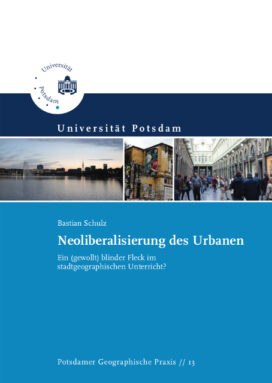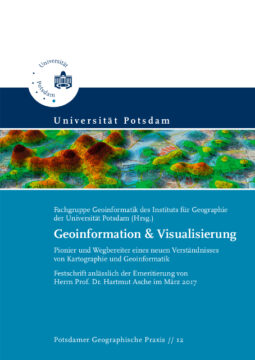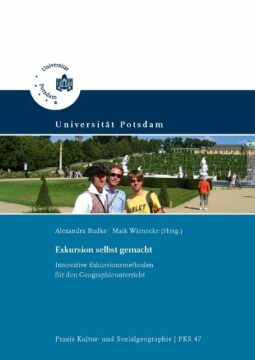Since the 1990s the neoliberal turn determines all essential fields of German society, starting with enterprise management via local government and state welfare through to school education. Especially (socially) critical researchers complain about the hegemony of neoliberal argumentation. They criticize that the generally accepted “common sense”-character of neoliberal logic makes it a truth without any alternatives.
It’s the aim of the book to analyse the (in-)visibility of neoliberal argumentation in school books and curricula of the state of Brandenburg from a critical perspective. The analysis is limited to questions of urban geography. The results are interpreted and contextualized in a historic reconstruction of geography as a school subject. Finally, the aim was to demonstrate how teachers can figure out a critical view on the topic “neoliberalization and city” to implement a critical geography into the lesson.
Ein (gewollt) blinder Fleck im stadtgeographischen Unterricht?
ISBN: 978-3-86956-403-6
165 pages
Release year 2017
Series: Potsdamer Geographische Praxis , 13
13,00 €
Non-taxable transaction according to § 1 (1) UStG/VAT Act in combination with § 2 (3) UStG/VAT Act a. F. Providing this service, the University of Potsdam does not constitute a Betrieb gewerblicher Art/Commercial Institution according to § 1 (1) No. 6 or § 4 KStG/Corporate Tax Act. If the legal characterization of our business is changed to a commercial institution subsequently, we reserve the right to invoice VAT additionally. zzgl. Versandkosten
Since the 1990s the neoliberal turn determines all essential fields of German society, starting with enterprise management via local government and state welfare through to school education. Especially (socially) critical researchers complain about the hegemony of neoliberal argumentation. They criticize that the generally accepted “common sense”-character of neoliberal logic makes it a truth without any alternatives.
It’s the aim of the book to analyse the (in-)visibility of neoliberal argumentation in school books and curricula of the state of Brandenburg from a critical perspective. The analysis is limited to questions of urban geography. The results are interpreted and contextualized in a historic reconstruction of geography as a school subject. Finally, the aim was to demonstrate how teachers can figure out a critical view on the topic “neoliberalization and city” to implement a critical geography into the lesson.
Recommended Books
-
 2017
2017Marlene Bamberg, Erik Borg, Bernd Fichtelmann, Ralf Jaumann, Peter Jordan, Andrea Naß, Franz Pietruska, Manfred Rolfes, Julia Siemer
Geoinformation & Visualisierung
16,00 €Non-taxable transaction according to § 1 (1) UStG/VAT Act in combination with § 2 (3) UStG/VAT Act a. F. Providing this service, the University of Potsdam does not constitute a Betrieb gewerblicher Art/Commercial Institution according to § 1 (1) No. 6 or § 4 KStG/Corporate Tax Act. If the legal characterization of our business is changed to a commercial institution subsequently, we reserve the right to invoice VAT additionally.
zzgl. Versandkosten
Add to cart -
 2009
2009Maik Wienecke, Alexandra Budke
Exkursion selbst gemacht
18,00 €Non-taxable transaction according to § 1 (1) UStG/VAT Act in combination with § 2 (3) UStG/VAT Act a. F. Providing this service, the University of Potsdam does not constitute a Betrieb gewerblicher Art/Commercial Institution according to § 1 (1) No. 6 or § 4 KStG/Corporate Tax Act. If the legal characterization of our business is changed to a commercial institution subsequently, we reserve the right to invoice VAT additionally.
zzgl. Versandkosten
Add to cart -
 2019
2019Ottmar Ette, Reinhard Andress, Ilse Jahn, Eberhard Knobloch, Tobias Kraft, Silvia Navia, Thomas Schmuck, Aliya-Katarina Südfels
Alexander von Humboldt im Netz ; 13 (2012) 24
28,00 €Non-taxable transaction according to § 1 (1) UStG/VAT Act in combination with § 2 (3) UStG/VAT Act a. F. Providing this service, the University of Potsdam does not constitute a Betrieb gewerblicher Art/Commercial Institution according to § 1 (1) No. 6 or § 4 KStG/Corporate Tax Act. If the legal characterization of our business is changed to a commercial institution subsequently, we reserve the right to invoice VAT additionally.
zzgl. Versandkosten
Add to cart -
 2015
2015Martin Legant, Berenike Schauwinhold, Malte Steinbrink, Tore Süßenguth, Michael Buning
Armut und Tourismus in Windhoek
15,50 €Non-taxable transaction according to § 1 (1) UStG/VAT Act in combination with § 2 (3) UStG/VAT Act a. F. Providing this service, the University of Potsdam does not constitute a Betrieb gewerblicher Art/Commercial Institution according to § 1 (1) No. 6 or § 4 KStG/Corporate Tax Act. If the legal characterization of our business is changed to a commercial institution subsequently, we reserve the right to invoice VAT additionally.
zzgl. Versandkosten
Add to cart
Contact
Potsdam University Library
University Press
Am Neuen Palais 10
14476 Potsdam
Germany
verlag@uni-potsdam.de
0331 977-2094
0331 977-2292





